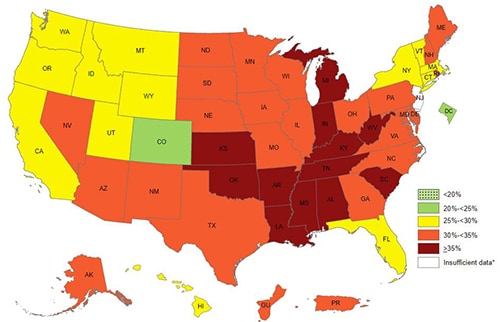Monitoring and Research
Data Guides Health Equity Strategies
CDC’s Division of Nutrition, Physical Activity, and Obesity (DNPAO) supports surveillance and research relevant to health disparities. The data help establish baselines, monitor trends over time, and ensure strategies account for the needs and barriers encountered by people experiencing health inequities. Examples include:
- Assessing childhood obesity prevalence by race/ethnicity among lower-income children taking part in Special Supplemental Nutrition Program for Women, Infants, and Children (WIC).
- Mapping adult obesity prevalence by race/ethnicity.
- Assessing breastfeeding rates by race/ethnicity.
- Compiling and evaluating data from several national and state surveys to track physical activity levels and trends for adults and young people.
Data, Trends, and Maps is an interactive tool that provides national and state-level data about the health status and behaviors of Americans as well as environmental or policy supports. Behavioral data can be examined by race/ethnicity and other sociodemographic characteristics.
National Collaborative for Childhood Obesity Research (NCCOR)external icon is a collaboration among CDC, the National Institutes of Health, the Robert Wood Johnson Foundation, and the US Department of Agriculture to address the problem of childhood obesity in America with particular attention to high-risk populations and communities.
Nutrition and Obesity Policy Research and Evaluation Network (NOPREN)external icon is a CDC-funded applied research network of the Prevention Research Centers. NOPREN members include researchers, evaluators, and practitioners. They assess how policies and programs enacted at the federal, state, local, and tribal levels affect families’ food and nutrition security, obesity, and health. The network studies how policies are carried out to improve access to healthier foods and beverages in childcare, schools, worksites, food pantries, and other community settings. The network also examines how policies address equity to ensure all have a fair opportunity to be healthy.
Physical Activity Policy Research and Evaluation Network (PAPREN)external icon is a CDC-funded research network that brings diverse partners together to create communities where all people can be healthy and physically active. The network conducts research and puts research into practice through collaboration across sectors with a shared vision: active people in active communities, supported by equitable, sustainable policies and practices. The network seeks to determine how these policies and practices can be expanded and improved based on evidence. A PAPREN equity and resilience work group focuses on the design, implementation, and maintenance of physical activity interventions that are equitable across social, economic, and demographic characteristics.

